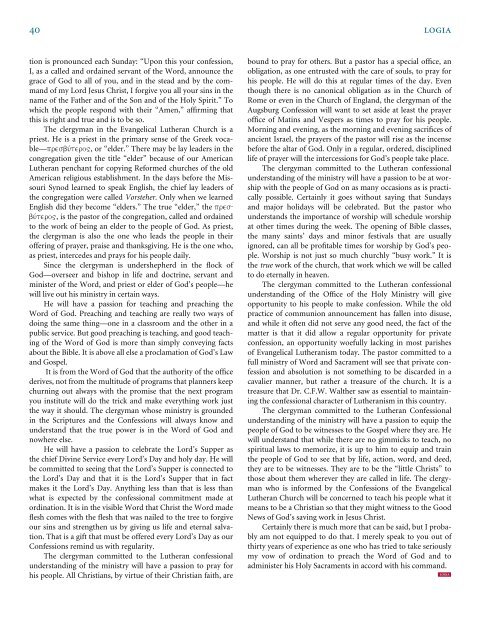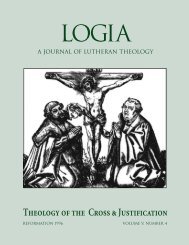You also want an ePaper? Increase the reach of your titles
YUMPU automatically turns print PDFs into web optimized ePapers that Google loves.
40 logia<br />
tion is pronounced each Sunday: “Upon this your confession,<br />
I, as a called and ordained servant of the Word, announce the<br />
grace of God to all of you, and in the stead and by the command<br />
of my Lord Jesus Christ, I forgive you all your sins in the<br />
name of the Father and of the Son and of the <strong>Holy</strong> Spirit.” To<br />
which the people respond with their “Amen,” affirming that<br />
this is right and true and is to be so.<br />
<strong>The</strong> clergyman in the Evangelical Lutheran Church is a<br />
priest. He is a priest in the primary sense of the Greek vocable—presbuvtero",<br />
or “elder.” <strong>The</strong>re may be lay leaders in the<br />
congregation given the title “elder” because of our American<br />
Lutheran penchant for copying Reformed churches of the old<br />
American religious establishment. In the days before the Missouri<br />
Synod learned to speak English, the chief lay leaders of<br />
the congregation were called Vorsteher. Only when we learned<br />
English did they become “elders.” <strong>The</strong> true “elder,” the presbuvtero",<br />
is the pastor of the congregation, called and ordained<br />
to the work of being an elder to the people of God. As priest,<br />
the clergyman is also the one who leads the people in their<br />
offering of prayer, praise and thanksgiving. He is the one who,<br />
as priest, intercedes and prays for his people daily.<br />
Since the clergyman is undershepherd in the flock of<br />
God—overseer and bishop in life and doctrine, servant and<br />
minister of the Word, and priest or elder of God’s people—he<br />
will live out his ministry in certain ways.<br />
He will have a passion for teaching and preaching the<br />
Word of God. Preaching and teaching are really two ways of<br />
doing the same thing—one in a classroom and the other in a<br />
public service. But good preaching is teaching, and good teaching<br />
of the Word of God is more than simply conveying facts<br />
about the Bible. It is above all else a proclamation of God’s Law<br />
and Gospel.<br />
It is from the Word of God that the authority of the office<br />
derives, not from the multitude of programs that planners keep<br />
churning out always with the promise that the next program<br />
you institute will do the trick and make everything work just<br />
the way it should. <strong>The</strong> clergyman whose ministry is grounded<br />
in the Scriptures and the Confessions will always know and<br />
understand that the true power is in the Word of God and<br />
nowhere else.<br />
He will have a passion to celebrate the Lord’s Supper as<br />
the chief Divine Service every Lord’s Day and holy day. He will<br />
be committed to seeing that the Lord’s Supper is connected to<br />
the Lord’s Day and that it is the Lord’s Supper that in fact<br />
makes it the Lord’s Day. Anything less than that is less than<br />
what is expected by the confessional commitment made at<br />
ordination. It is in the visible Word that Christ the Word made<br />
flesh comes with the flesh that was nailed to the tree to forgive<br />
our sins and strengthen us by giving us life and eternal salvation.<br />
That is a gift that must be offered every Lord’s Day as our<br />
Confessions remind us with regularity.<br />
<strong>The</strong> clergyman committed to the Lutheran confessional<br />
understanding of the ministry will have a passion to pray for<br />
his people. All Christians, by virtue of their Christian faith, are<br />
bound to pray for others. But a pastor has a special office, an<br />
obligation, as one entrusted with the care of souls, to pray for<br />
his people. He will do this at regular times of the day. Even<br />
though there is no canonical obligation as in the Church of<br />
Rome or even in the Church of England, the clergyman of the<br />
Augsburg Confession will want to set aside at least the prayer<br />
office of Matins and Vespers as times to pray for his people.<br />
Morning and evening, as the morning and evening sacrifices of<br />
ancient Israel, the prayers of the pastor will rise as the incense<br />
before the altar of God. Only in a regular, ordered, disciplined<br />
life of prayer will the intercessions for God’s people take place.<br />
<strong>The</strong> clergyman committed to the Lutheran confessional<br />
understanding of the ministry will have a passion to be at worship<br />
with the people of God on as many occasions as is practically<br />
possible. Certainly it goes without saying that Sundays<br />
and major holidays will be celebrated. But the pastor who<br />
understands the importance of worship will schedule worship<br />
at other times during the week. <strong>The</strong> opening of Bible classes,<br />
the many saints’ days and minor festivals that are usually<br />
ignored, can all be profitable times for worship by God’s people.<br />
Worship is not just so much churchly “busy work.” It is<br />
the true work of the church, that work which we will be called<br />
to do eternally in heaven.<br />
<strong>The</strong> clergyman committed to the Lutheran confessional<br />
understanding of the Office of the <strong>Holy</strong> <strong>Ministry</strong> will give<br />
opportunity to his people to make confession. While the old<br />
practice of communion announcement has fallen into disuse,<br />
and while it often did not serve any good need, the fact of the<br />
matter is that it did allow a regular opportunity for private<br />
confession, an opportunity woefully lacking in most parishes<br />
of Evangelical Lutheranism today. <strong>The</strong> pastor committed to a<br />
full ministry of Word and Sacrament will see that private confession<br />
and absolution is not something to be discarded in a<br />
cavalier manner, but rather a treasure of the church. It is a<br />
treasure that Dr. C.F.W. Walther saw as essential to maintaining<br />
the confessional character of Lutheranism in this country.<br />
<strong>The</strong> clergyman committed to the Lutheran Confessional<br />
understanding of the ministry will have a passion to equip the<br />
people of God to be witnesses to the Gospel where they are. He<br />
will understand that while there are no gimmicks to teach, no<br />
spiritual laws to memorize, it is up to him to equip and train<br />
the people of God to see that by life, action, word, and deed,<br />
they are to be witnesses. <strong>The</strong>y are to be the “little Christs” to<br />
those about them wherever they are called in life. <strong>The</strong> clergyman<br />
who is informed by the Confessions of the Evangelical<br />
Lutheran Church will be concerned to teach his people what it<br />
means to be a Christian so that they might witness to the Good<br />
News of God’s saving work in Jesus Christ.<br />
Certainly there is much more that can be said, but I probably<br />
am not equipped to do that. I merely speak to you out of<br />
thirty years of experience as one who has tried to take seriously<br />
my vow of ordination to preach the Word of God and to<br />
administer his <strong>Holy</strong> Sacraments in accord with his command.<br />
LOGIA

















